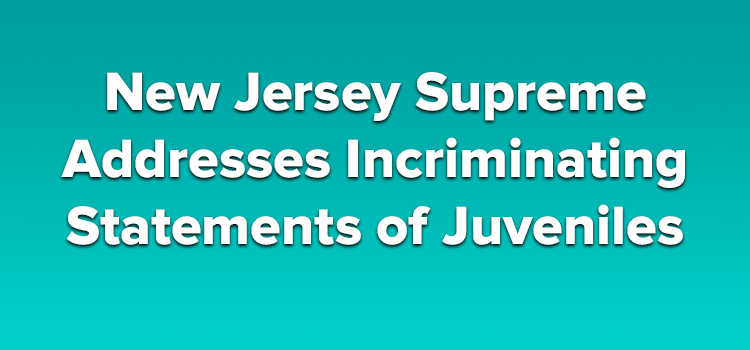In State of New Jersey in the Interest of A.A., (A-50-18) (081793) (Decided January 15, 2020), the Supreme Court of New Jersey clarified when the incriminating statements of a juvenile can be used against him or her. According to the court, “To address the special concerns presented when a juvenile is brought into custody, police officers should advise juveniles of their Miranda rights in the presence of a parent or guardian before the police question, or a parent speaks with, the juvenile.”

Facts of State of New Jersey in the Interest of A.A.
A.A., who was 15 years old at the time, was stopped by police following a shooting in Jersey City. Based on Officer Joseph Labarbera’s description of the subjects and a subsequent positive identification, A.A. was taken into custody, brought to a juvenile facility, and placed in a holding cell. In accordance with State v. Presha, 163 N.J. 304, 316 (2000), the police contacted his mother. In Presha, the New Jersey Supreme Court directed law enforcement officers to “use their best efforts to locate a parent or legal guardian” before starting to interrogate a juvenile in custody. The rationale was that an otherwise intimidating setting, parents can help juveniles understand they have the right not to incriminate themselves and the right to have an attorney present — and can help juveniles decide whether to waive their rights.
Detective Joseph Chidichimo told A.A.’s mother why he was under arrest. A.A.’s mother asked to speak with her son, and the officers took her to where A.A. was detained. The police allowed A.A. and his mother to speak through the gate of the holding cell. At no point did the police advise A.A. of his rights.
Chidichimo testified at a pretrial hearing that he overheard the conversation between A.A. and his mother. According to the detective, A.A.’s mother asked if he had been on Wilkinson Avenue, and he confirmed that he had. When she asked why, A.A. responded, “because they jumped us last week.” A.A.’s mother testified at the hearing. She explained that the police told her A.A. had “shot somebody” and that she asked to speak with her son. She said she was crying and spoke in a loud voice, and that she and her son could see multiple officers in the room at the time. She testified that A.A. denied “do[ing] that” and said nothing about “being jumped.”
A.A. was charged with two counts of attempted murder as well as weapons offenses. A judge adjudicated A.A. delinquent on two counts of aggravated assault and all weapons charges, relying heavily on Officer Labarbera’s testimony that he observed A.A. riding a bicycle on Wilkinson Avenue just before the shooting; the surveillance video; and Detective Chidichimo’s account of A.A.’s statement to his mother. The Appellate Division reversed and remanded for a new hearing. It held that even though the officers did not question A.A. directly, their actions subjected him to the functional equivalent of police interrogation.
New Jersey Supreme Court’s Decision in State of New Jersey in the Interest of A.A.
The New Jersey Supreme Court agreed. It held that the actions of the police amounted to the functional equivalent of interrogation. Accordingly, it found that A.A. should have been advised of his rights under Miranda v. Arizona, 384 U.S. 436 (1966), in the presence of his mother.
“The police should have known it was reasonably likely that A.A.’s mother would elicit incriminating responses from him. Although we find no evidence of bad faith on the part of the police, their words and actions set in motion A.A.’s incriminating statements to his mother,” the court wrote. “[T]herefore, A.A. was subjected to the ‘functional equivalent’ of express questioning while in custody. His statements, obtained without the benefit of any Miranda warnings, are thus inadmissible.”
According to the court, the circumstances surrounding A.A.’s arrest “upended” the standard set forth in Presha. “Instead of serving as a buffer to help a juvenile understand his rights, the child’s mother unwittingly assisted the police and helped gather incriminating evidence,” the court wrote.
Going forward, the New Jersey Supreme Court added the following guidance:
To address the special concerns presented when a juvenile is brought into custody, police officers should advise juveniles of their Miranda rights in the presence of a parent or guardian before the police question, or a parent speaks with, the juvenile. Officers should then let the parent and child consult in private. That approach would afford parents a meaningful opportunity to help juveniles understand their rights and decide whether to waive them.
Because the court found that A.A.’s inadmissible statements comprised a substantial part of the proofs against him, it found that a new hearing is necessary.
